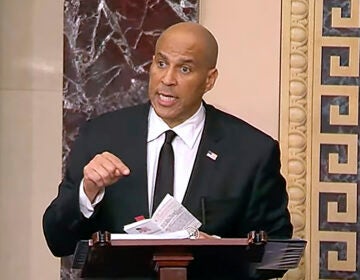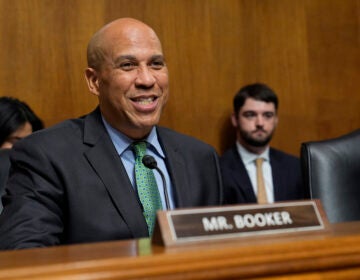Congressman Chris Smith faces two challengers in the newly redrawn 4th District
Brian Froelich, making his first run for office at age 66 against Rep. Chris Smith, R-4th District, said his friends suggested starting with a county freeholder race.
Though that would have been much less of a hurdle than trying to dislodge New Jersey’s senior member of Congress, Froelich said he is not interested in local or state office.
Brian Froelich, Democratic contender for Congress
“As I see it, the problems are in Washington,” said Froelich, a business executive and consultant from Spring Lake who ran unopposed in June’s Democratic primary.
Citing a few of the problems he has with Smith’s positions, Froelich said he supports the health care law that Smith voted to repeal. He disagrees with Smith’s vote for Republican Rep. Paul Ryan’s budget plan, which sought cuts in Medicaid, food stamps and other programs. And he says Smith was wrong to join more than 200 House Republicans in signing a pledge to never raise taxes.
Froelich is not the only candidate facing the uphill challenge of trying to unseat the 31-year incumbent. Independent Leonard P. Marshall, 60, of Neptune is also on the ballot.
Smith has proven popular with voters — the 16-term congressman was re-elected in 2010 with 69 percent of the vote and he easily turned away a GOP challenger in June, getting about 84 percent of the vote.
Redistricting arguably solidified his hold on the district, with Joseph Patten, chair of the political science department at Monmouth University, saying, “The district is generally regarded as a little more Republican than it was before.”
Rep. Chris Smith
Smith, in a statement last December praising the redrawn maps, said he had represented parts of all three counties for more than a quarter-century, and that more than three in four constituents live in a municipality that he had represented at some point.
Overall, registered Republicans in the district outnumber Democrats about 127,000 to 114,000, according to data recently compiled from three county election boards, with unaffiliated voters totaling more than 263,000. Republicans outnumber Democrats in Monmouth, which has the biggest percentage of voters in the district, and in Ocean. Democrats have an edge in Mercer, which has the smallest share.
Not surprisingly, Smith is way ahead of Froelich in fundraising. As of June 30, Smith’s campaign had received $388,406 in donations, with $306,788 yet to be spent, according to the Federal Election Commission. Froelich’s campaign listed $22,517 in donations, with $11,213 remaining. No figures were available for Marshall. Third-quarter reports are due to be released Oct. 15.
“I’m not raising any funds,” Marshall said. “It’s sort of silly to go out raising money when I really disapprove of most of the fundraising being done.”
Again demonstrating the advantage of incumbency, Smith listed $126,350 from political action committees, while Froelich did not report a single PAC donation.
“Financially, most groups will not give money to challengers,” Froelich said. “It’s understandable.”
To try to level the playing field, Froelich said he has unsuccessfully sought the opportunity to appear at a candidates’ forum or debate with Smith, 59, who first took office in 1981.
“I’ll meet him any time and any place,” Froelich said.
He’s not the only one having trouble getting Smith to talk.
NJ Spotlight placed multiple phone calls and sent several e-mails over a 10-day period in an effort to get an interview with Smith about his record and his perspective on the issues. At the request of Smith’s campaign, NJ Spotlight extended the deadline for the first of its two stories on the race and agreed to a telephone interview at a time and date chosen by the Smith campaign. However, twenty minutes after the interview was to have begun, a Smith representative called on his behalf to cancel.
With incumbency, voter demographics and money on his side, Smith, perhaps, has little incentive to debate his rivals or subject himself to media questions.
Smith helped run his family’s sporting goods business prior to being elected in 1980, a race in which he was boosted by President Reagan’s landslide win, according to information in his official biography on his congressional website. He is the most senior of 26 Republicans on the House Committee on Foreign Affairs and lives in Robbinsville.
Both his congressional website and his campaign site tout his sponsorship of anti-human trafficking laws, and also his role in supporting federal research for autism, Lyme disease and Alzheimer’s disease.
Smith, who was executive director of the New Jersey Right to Life Committee prior to his 1980 election, is known as one of the strongest anti-abortion advocates in Congress and co-chairs the Bipartisan Congressional Pro-Life Caucus.
Regardless of his political ideology, Patten said a key to Smith’s longevity has been his office’s responsiveness to routine matters.
“He’s very, very good at constituent case work,” he said.
Leonard P. Marshall
While Smith is known as a conservative, challenger Marshall is a former chairman of the state Conservative Party. He is currently listed on the ballot with no slogan, and is contesting in court the denial of his bid to be listed on the ballot as a member of the “Democratic-Republican Party.”
This isn’t the first time the insurance inspector and licensed public adjuster has taken on Smith. Marshall has run for office several times, including a losing campaign in the Fourth District two decades ago.
Marshall, who said Smith “has done nothing to help New Jersey,” is critical of both major parties. He opposes the federal health care law and supports reducing by at least 10 percent what he described as “current unconstitutional spending.”
Froelich, according to his campaign website, began his career as an accountant with Arthur Anderson. He worked as a management consultant with Coopers and Lybrand before founding his own business in 1980, which he called BPF Travel. The P, he explained, stood for Patrick, his middle name.
“It wasn’t too creative,” he joked.
He said that his company generated annual sales of more than $200 million before being sold to American Express, though he stayed on an additional decade as an executive.
He described himself as semi-retired, saying he continues to do consulting work.
At a disadvantage in name recognition and fundraising, Froelich is putting his business networking skills to work. “I tell people I have to meet 700,000 people between now and Nov. 6,” he said.
WHYY is your source for fact-based, in-depth journalism and information. As a nonprofit organization, we rely on financial support from readers like you. Please give today.




